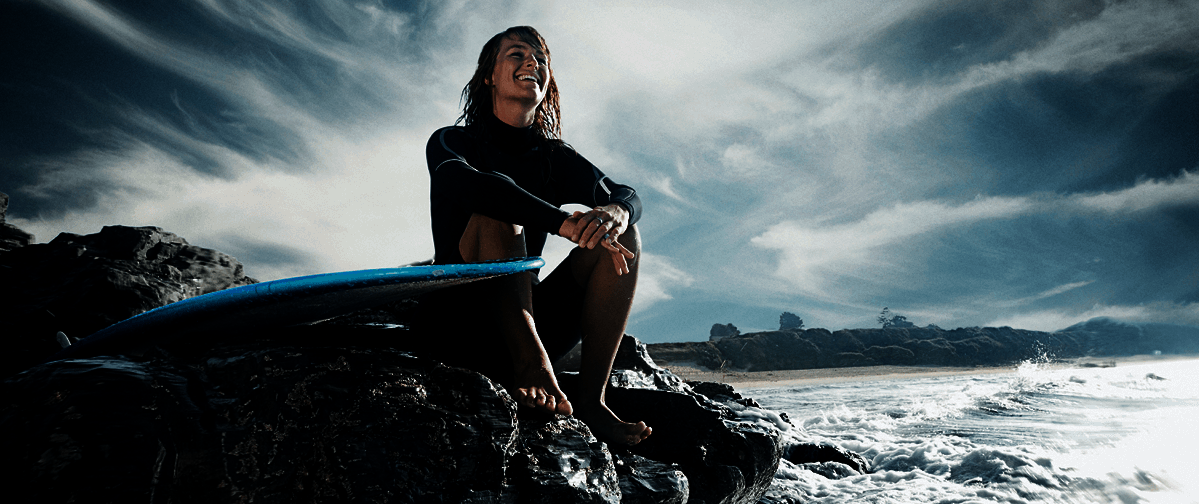STENGTH TRAINING FOR SURFING
Too many surfers retire due injury. Too many surfers get out of the water because of fatigue. Too many surfers miss waves because they've lost their paddle strength. Too many surfers aren't performing at their best.
If this is you, or might be you soon, read more below.
To surf well, whether you are a professional or a weekend warrior, requires strength in specific muscles. Surfing often (if you are one of the lucky ones) isn't enough - and too much of a good thing can lead to imbalances and eventual injury.
To get the most out of your time IN the water - you need to prepare OUT of the water. Conditioning muscles on land can help improve your ability to paddle fast enough to catch the next wave, when you've been out for an hour and you want to stay for one more (hour) and can make the difference to how long it takes you to recover between surfs.
To be more Specific Surfers need:
- A strong core as a foundation of every aspect of surfing
- Powerful paddling muscles, including the lats, to help you maximise your wave count and help you to catch the wide ones - which could be the wave of the day!
- Athletic hip and leg muscles to go deep on the bottom turns and to send the buckets of spray off the top.
- Durable neck muscles to maintain your posture and protect the head and neck in heavy wipeouts
There is high level evidence that strength training can prevent sporting injuries (Laurensen 2014). A serious injury can mean extended periods out of the water.
Common areas surfers injure include:
- Neck pain – from holding your head up looking for a wave
- Back pain - from long periods lying on your board
- Shoulders - overuse from paddling is common and acute injuries can occur such as dislocations in a wipeout.
- Knees - acute and overuse injuries to MCLs, ACLs, meniscus, and cartilage are common.
- Hips - repetitive flexion and rotation over the hip joint can lead to strain and eventual degeneration.
- Ankles - Lateral and high ankle sprains are more and more common with the increase in aerials performed and being compressed in a barrel is a common way to injure the ankle, the hip or the knee.
- The stronger we are around these areas the less likely we are to sustain an injury.
While we need strength in certain areas, We also need to be flexible to surf well. A common concern is that the gym can make you less flexible, and this can be true if you train incorrectly. Being strong in the key stability muscles will reduce the overactivity in the global muscles and improve your flexibility better than stretching ever will. Kieser is a high quality method to target these key muscles and we work with a huge number of elite and amateur surfers. We have specialised Swiss designed exercise equipment that can test the strength of specific muscles, as well train these muscles that can be so hard to target.
Ross Clarke Jones, one of the best big wave surfers in the world, used Kieser to avoid knee surgery after a horrific injury in April 2015. A giant wave compressed his knee and tore his anterior cruciate and medial collateral ligaments. Two different surgeons advised to operate, but lucky for him he was eventually referred to Kieser to conservatively rehabilitate his knee. After 3 months of Kieser strength and conditioning, Ross was back surfing mellow waves using a brace. After 4 months he was tow surfing 15 foot waves and you couldn’t hold him back! The following Hawaiian summer he surfed in "The Eddie Aikau," one of the most prestigious big wave events in the world, and came a close second. He credits Kieser for getting him back there and often says “At 49 years old my only regret is not starting Kieser 20 years ago.”
He still to this day says his “Knee feels Better and Stronger than pre-injury thanks to Kieser. ”
For all of you who love surfing (Like so many of the Kieser team) - we want you to keep surfing well as long as possible! So if you want to stay injury free, be more powerful, recover quicker and feel stronger in the water - make sure you are strength training on land so you are strong in the water!
References:
Lauersen, J. B., Bertelsen, D. M., Andersen, L. B. (2014). The effectiveness of exercise interventions to prevent sports injuries: a systematic review and meta-analysis of randomised controlled trials. British Journal of Sports Medicine, 48, 871-877






























